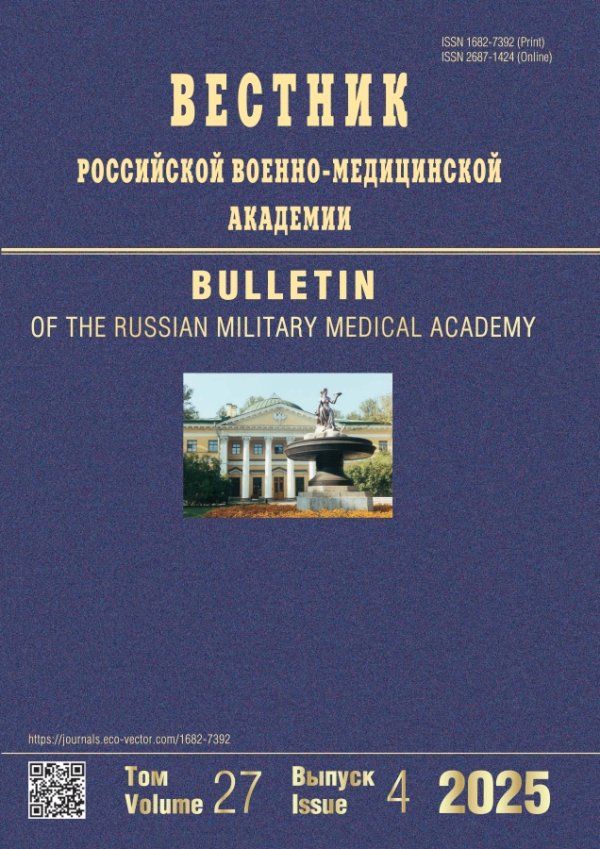The stimulating effects of exometabolites of microalgae chlorella vulgaris on the lactic acid bacteria bacillus coagulans
- Authors: Markin I.V.1, Zhurbin E.A.1, Potapov P.K.1, Shchelkanova E.S.1, Molodchenko A.N.1, Stepanenko N.I.1
-
Affiliations:
- Military Innovative Technopolis "ERA"
- Issue: Vol 23, No 4 (2021)
- Pages: 187-194
- Section: Experimental trials
- URL: https://ogarev-online.ru/1682-7392/article/view/75842
- DOI: https://doi.org/10.17816/brmma75842
- ID: 75842
Cite item
Abstract
This study aimed to determine the stimulating effect of exometabolites of microalgae Chlorella Vulgaris IPPAS C-2 — indole compounds that are cultured on wastewater model solution. The purification process of a model wastewater solution with Chlorella Vulgaris microalgae obtained biomass of microalgae with a high lipid content (up to 50%), whereas the residual concentrations of pollutants in the solution were ammonium cations of 1.5 mg/l and phosphate anions of 3.5 mg/l. The residual concentration of microorganisms in the purified model sample of wastewater does not exceed 0.3 million CFU/ml. Growth factors of indole nature, which are external metabolites of microalgae, were also found in the solution. Purified effluents were used in the microbiological synthesis of lactic acid to confirm the stimulating effect of accumulated metabolites. The control sample was a nutrient medium based on malt germ extract. The glucose concentration in all samples is the same and is 140 g/l. A strain of lactic acid bacteria Bacillus coagulans B-10468 was used as a test culture. The highest concentration of lactic acid bacteria (100 million cells/ml) was observed in a sample containing microalgae metabolites. This concentration is 1.7 times higher than in the control sample. In the future, the growth rate of Bacillus coagulans cells slowed down since the concentration of lactic acid reached the limit values of 30–50 g/l on the 3rd day, which contributed to the bacterial cell growth inhibition. The use of a growth stimulator based on treated wastewater by microalgae in the cultivation of bacteria of the species Bacillus coagulans B-10468 increases the specific rate of accumulation of bacterial biomass (0.27 day–1), which is 26% more than in the control sample; increases the yield of lactic acid (120 g/l) by 25% compared with the traditional stimulant — malt sprouts. The lactic acid production using growth stimulants from wastewater treatment with microalgae will reduce the cost of its production. The use of this technological solution will provide an opportunity to reduce the cost of polymer, polylactide, which is one of the main materials for additive technologies.
Keywords
Full Text
##article.viewOnOriginalSite##About the authors
Ilya V. Markin
Military Innovative Technopolis "ERA"
Author for correspondence.
Email: ilya.markin.92@bk.ru
SPIN-code: 6021-7645
head of research laboratory
Russian Federation, AnapaEvgeny A. Zhurbin
Military Innovative Technopolis "ERA"
Email: zhurbin-90@mail.ru
ORCID iD: 0000-0002-0867-3838
SPIN-code: 8426-1354
Scopus Author ID: 57198886746
head of department
Russian Federation, AnapaPyotr K. Potapov
Military Innovative Technopolis "ERA"
Email: footballprospb@gmail.com
SPIN-code: 5979-4490
deputy head of department
Russian Federation, AnapaElena S. Shchelkanova
Military Innovative Technopolis "ERA"
Email: shchelkanova_el@mail.ru
ORCID iD: 0000-0003-0672-8820
SPIN-code: 8396-0602
Scopus Author ID: 35280517700
candidate of biological sciences
Russian Federation, AnapaAlexander N. Molodchenko
Military Innovative Technopolis "ERA"
Email: era_8li@mail.ru
head of the laboratory
Russian Federation, AnapaNikita I. Stepanenko
Military Innovative Technopolis "ERA"
Email: ni-stepanenko@yandex.ru
senior operator
Russian Federation, AnapaReferences
- Wang X, Jiang M, Zhou Z, et al. 3D printing of polymer matrix composites: A review and prospective. Composites Part B: Engineering. 2017;110:442–458. doi: 10.1016/j.compositesb.2016.11.034
- Rose L. On the degradation of porous stainless steel in low and intermediate temperature solid oxide fuel cell support materials [dissertation]. Vancouver: University of British Columbia; 2011. 307 p.
- Galante R, Figueiredo-Pina C, Serro A. Additive manufacturing of ceramics for dental applications: A review. Dental Materials. 2019;35(6):825–846. doi: 10.1016/j.dental.2019.02.026
- Ma K, Hu G, Pan L, et al. Highly efficient production of optically pure l-lactic acid from corn stover hydrolysate by thermophilic Bacillus coagulans. Bioresourсe Technology. 2016;219:114–122. doi: 10.1016/j.biortech.2016.07.100
- Zhou J, Ouyang J, Xu Q, et al. Cost-effective simultaneous saccharification and fermentation of l -lactic acid from bagasse sulfite pulp by Bacillus coagulans CC17. Bioresourсe Technology. 2016;222:431–438. doi: 10.1016/j.biortech.2016.09.119
- Bespomestnyh KV, Galstjan AG, Korotkaja EV. Issledovanie biohimicheskih i morfologicheskih svojstv shtammov bakterij roda Lactobacillus. Tehnika i tehnologija pishhevyh proizvodstv. 2011;3(2):94–98. (In Russ.).
- Dvoreckij DS, Temnov MS, Markin IV. Ocenka kompleksnogo ispol’zovanija stochnyh vod dlja biosinteza lipidov i molochnoj kisloty. Voprosy sovremennoj nauki i praktiki. 2017;(3):9–16. (In Russ.).
- Dvoreckij DS, Zjuzina OV, Markin IV, et al. Sovershenstvovanie uslovij biosinteza molochnoj kisloty laktobakterijami. Vestnik Kazanskogo tehnologicheskogo universiteta. 2017;8(8):126–130. (In Russ.).
- Markin IV, Santalov RD, Bushkovskaja AI, et al. Kul’tivirovanie mikrovodorosli Chlorella vulgaris na gorodskih stochnyh vodah. In: Vserossijskaja nauchno-prakticheskaja konferencija studentov, aspirantov i molodyh uchenyh s mezhdunarodnym uchastiem. Sep. 28–30, 2017.. (In Russ.).
- Baglieri A, Sidella S, Barone V, et al. Cultivating Chlorella vulgaris and Scenedesmus quadricauda microalgae to degrade inorganic compounds and pesticides in water. Environmental Science and Pollution Research. 2016;23(18):18165–18174. doi: 10.1007/s11356-016-6996-3
- Amaro HM, Guedes AC, Malcata FX. Antimicrobial activities of microalgae: an invited review. In: Science against microbial pathogens: communicating current research and technological advances. 2011.
- Dvoreckij DS. Osnovy biojenergetiki [CD ROM]. Tambov: TGTU; 2018. (In Russ.).
- Gol’din EB, Gol’dina VG. Antibakterial’nye svojstva metabolitov vodoroslej v model’nyh jeksperimentah. Al’gologija. 1999;2:34. (In Russ.).
- Markin IV. Ispol’zovanie mikrovodorosli Chlorella vulgaris dlja ochistki stochnyh vod. In: Vserossijskij otkrytyj konkurs studentov vuzov i molodyh issledovatelej "Vzgljad molodyh na problemy regional’noj jekonomiki". Tambov. Oct. 16–17, 2017 (In Russ.). Available from: https://biblioclub.ru/index.php?page=book&id=499435&lang=ru
- Wang L, Chen X, Wang H, et al. Chlorella vulgaris cultivation in sludge extracts from 2,4,6-TCP wastewater treatment for toxicity removal and utilization. Journal of Environmental Management. 2017;187:146–153. doi: 10.1016/j.jenvman.2016.11.020
- Ghasemi Y. Antifungal and Antibacterial Activity of the Microalgae Collected from Paddy Fields of Iran: Characterization of Antimicrobial Activity of Chroococcus dispersus. Journal of Biological Sciences. 2007;7(6):904–910. doi: 10.3923/jbs.2007.904.910
Supplementary files











